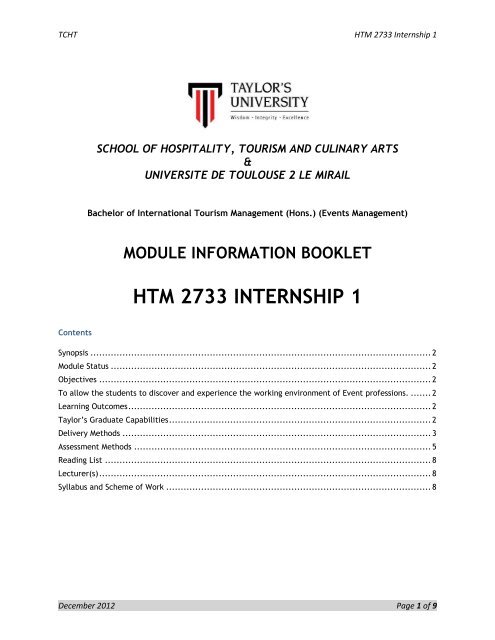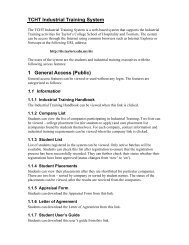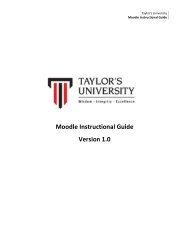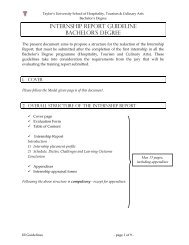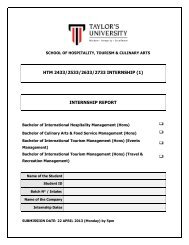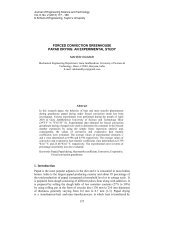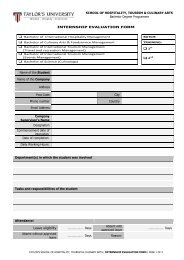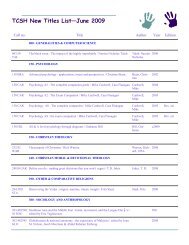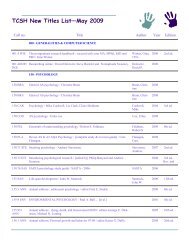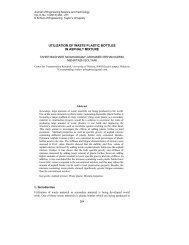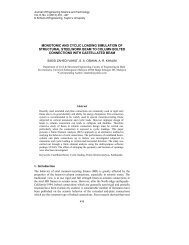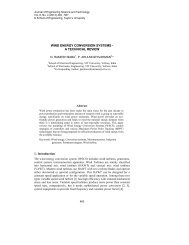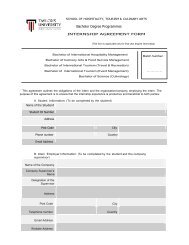htm 2733 internship 1 - Taylor's University Industrial Training System
htm 2733 internship 1 - Taylor's University Industrial Training System
htm 2733 internship 1 - Taylor's University Industrial Training System
You also want an ePaper? Increase the reach of your titles
YUMPU automatically turns print PDFs into web optimized ePapers that Google loves.
TCHT HTM <strong>2733</strong> Internship 1<br />
SCHOOL OF HOSPITALITY, TOURISM AND CULINARY ARTS<br />
&<br />
UNIVERSITE DE TOULOUSE 2 LE MIRAIL<br />
Bachelor of International Tourism Management (Hons.) (Events Management)<br />
MODULE INFORMATION BOOKLET<br />
HTM <strong>2733</strong> INTERNSHIP 1<br />
Contents<br />
Synopsis ..................................................................................................................... 2<br />
Module Status .............................................................................................................. 2<br />
Objectives .................................................................................................................. 2<br />
To allow the students to discover and experience the working environment of Event professions. ....... 2<br />
Learning Outcomes ........................................................................................................ 2<br />
Taylor’s Graduate Capabilities .......................................................................................... 2<br />
Delivery Methods .......................................................................................................... 3<br />
Assessment Methods ...................................................................................................... 5<br />
Reading List ................................................................................................................ 8<br />
Lecturer(s) .................................................................................................................. 8<br />
Syllabus and Scheme of Work ........................................................................................... 8<br />
December 2012 Page 1 of 9
TCHT HTM <strong>2733</strong> Internship 1<br />
Synopsis<br />
The <strong>internship</strong> in events consists of three components: Pre-<strong>internship</strong> workshops, a 12-week supervised<br />
working period, and a post-<strong>internship</strong> report. The pre-<strong>internship</strong> workshops introduce students to<br />
professional working attitude; teamwork; leadership and multicultural workplace strategies. The<br />
<strong>internship</strong> is designed to expand career knowledge while increasing speed, timing, organization, and<br />
ability to handle deadlines in an approved Travel and Recreation company. The post-<strong>internship</strong><br />
exercise consists of: the industry attachment supervisor’s evaluation (1), an <strong>internship</strong> report (2) and<br />
the portfolio (3) recording and reflecting on the work experience. All components are being graded.<br />
Module Status<br />
Module Credits : 3<br />
Module Status : Core for BE<br />
Pre – Requisite : Nil<br />
BE : Bachelor of International Tourism Management (Hons.) (Events Management)<br />
Objectives<br />
To allow the students to discover and experience the working environment of Event professions.<br />
Learning Outcomes<br />
Upon successful completion of this module, students will be able to:<br />
1. Demonstrate professional working attitudes<br />
2. Comprehend the work environment in events sector<br />
3. Operate in professional events working environment<br />
4. Apply their practical/theoretical knowledge in events<br />
5. Apply the steps required to be prepared for <strong>internship</strong>/employment<br />
6. Develop events management skills<br />
Taylor’s Graduate Capabilities<br />
In addition to this module’s specific learning outcomes, students have also opportunities to develop any<br />
of the following skills depending on their <strong>internship</strong> placement and situation:<br />
Discipline Specific Knowledge<br />
1.0 TGC: Discipline Specific Knowledge<br />
1.1 Able to put theories into practice.<br />
1.2 Understand ethical issues in the context of the field of study.<br />
1.3 Understand professional practice within the field of study.<br />
* This TGC is further clarified according to the respective program-specific outcomes.<br />
Cognitive Capabilities<br />
2.0<br />
3.0<br />
TGC: Lifelong learning<br />
2.1 Learn independently<br />
2.2 Locate, extract, synthesise and utilise information effectively.<br />
2.3 Be intellectually engaged<br />
TGC: Thinking and Problem Solving skills<br />
December 2012 Page 2 of 9
TCHT HTM <strong>2733</strong> Internship 1<br />
Soft Skills<br />
3.1 Think critically and creatively.<br />
3.2 Define and analyse problems to arrive at effective solutions.<br />
4.0<br />
5.0<br />
6.0<br />
7.0<br />
8.0<br />
TGC: Communication Skills<br />
4.1 Communicate appropriately in various settings and modes.<br />
TGC: Interpersonal Skills<br />
5.1 Understand team dynamics and mobilise the power of teams.<br />
5.2 Understand and assume leadership.<br />
TGC: Intrapersonal Skills<br />
6.1 Manage oneself and be self-reliant.<br />
6.2 Reflect on one’s actions and learning.<br />
6.3 Embody Taylor’s core values.<br />
TGC: Citizenship and Global Perspectives<br />
7.1 Be aware of and form opinions from diverse perspectives.<br />
7.2 Understand the value of civic responsibility and community engagement.<br />
TGC: Digital Literacy<br />
8.1 Effective use of Information and Communications Technology (ICT)<br />
and related technologies.<br />
Delivery Methods<br />
Contact Hours<br />
Pre-<strong>internship</strong> Module : Various organised briefings/workshops sessions in semester 3 or 4<br />
Internship : 12 weeks of industrial placement<br />
In reference to Taylor’s <strong>University</strong>’s Teaching and Learning Framework, the following instructional or<br />
delivery methods may be adopted for this module depending on the requirement.<br />
Authentic learning<br />
Authentic Learning refers to the ideas that learners should be presented with problems that are<br />
realistic situations and found in everyday applications of knowledge (Smith and Ragan, 1999).<br />
There should be an opportunity to distinguish between relevant and irrelevant information. Finding<br />
and defining problems as well as solving them should be a generative process.<br />
Collaborative Learning<br />
Collaborative Learning, also called cooperative learning, is heavily emphasized in most<br />
constructivist approaches (Roblyer et al, 1996). Students working in groups to solve problems<br />
demonstrate the notion of distributive intelligence, which states that accomplishment is not a<br />
function of one person, but a group in which each contributes to the achievement of desired goals.<br />
December 2012 Page 3 of 9
TCHT HTM <strong>2733</strong> Internship 1<br />
Cooperative learning is an ideal way for students to learn the skills that extend beyond that extend<br />
beyond the classroom of sharing responsibility and working together toward common goals.<br />
According to Driscoll (2000), collaboration also provides students with a way to understand point of<br />
view outside their own.<br />
Discovery learning<br />
At one end of the discovery learning spectrum we find discovery learning in its simplest form. The<br />
tools and information needed to solve a problem or learn a concept are provided and the learners<br />
make sense of them.<br />
Another definition is discovery learning as experimentation with some extrinsic intervention such as<br />
clues, coaching, and a framework to help learners get to a reasonable conclusion. At the other end<br />
of continuum is the expository teaching model of discovery learning where the learners “discovers”<br />
what the teacher decides he is to discover using a process prescribed by the teacher.<br />
Generative Learning<br />
Generative learning is a learning process in which learners are given an overall problem and are<br />
asked to generate sub-problems, sub-goals and strategies in order to achieve the larger task.<br />
Generative learning strategies can be divided into four major stages:<br />
1. Recalling information from long term-term memory<br />
2. Integrating new knowledge with prior knowledge<br />
3. Relating prior knowledge to new concepts and ideas in a meaningful way<br />
4. Connecting new materials to information or ideas already in the learner’s mind<br />
Using this strategy, a learner relates new ideas to prior knowledge in order to provide meaning to<br />
the new material.<br />
Goal –Based Scenarios<br />
Goal based Scenarios (GBS) offer learners the opportunity to role-play from a certain point of view.<br />
Their goal is for the learner to accomplish a mission or task associated with their role in scenario.<br />
In order to achieve this goal, the learner needs to acquire particular skills and knowledge.<br />
Student Self and Independent Study<br />
Lecturers are not the sole provider of knowledge and information as these are unlimited. Students<br />
are expected to practice self and independent studies for at least 9 hours for this module.<br />
Note: Please refer to Taylor’s <strong>University</strong>’s Teaching and Learning Framework for the detailed<br />
descriptions of each instructional method.<br />
December 2012 Page 4 of 9
TCHT HTM <strong>2733</strong> Internship 1<br />
Assessment Methods<br />
Assessment Components (%) Proportion (%)<br />
Pre-<strong>internship</strong> <strong>Training</strong>/Workshops/Briefings 10<br />
Internship period (pre-requisite: complete Pre-<strong>internship</strong> <strong>Training</strong>) 50<br />
(i) Internship Evaluation Form(s) by Supervisor 50<br />
Post Internship Report 40<br />
(i) E-portfolio 10<br />
(ii) Internship Report 30<br />
Total 100<br />
Pre-<strong>internship</strong> <strong>Training</strong> (10%)<br />
It consists of workshops organized by the Career Centre with the collaboration of the lecturer in<br />
charge. It includes an <strong>internship</strong> module briefing presented by the lecturer in charge. Students are<br />
exposed to the requirements and needs they will face during the industrial attachment. Students<br />
are prepared with reporting writing, as well as the e-portfolio briefing.<br />
Learning outcome assessed – 5<br />
Student must attend all the pre-<strong>internship</strong> briefings and workshops, in order to proceed to<br />
company’s placement.<br />
Attendance is taken. Students are compulsory to attend all the workshops and briefings organized<br />
for the purpose of <strong>internship</strong>. Failure to attend any of these workshop or briefing will lead to a<br />
0/10 mark for the specific Pre-<strong>internship</strong> component.<br />
Internship Period (50%)<br />
Industry Evaluation Forms (50%)<br />
Learning outcome assessed – 1, 3, 4 & 6<br />
Refer to appendix/annex 1: Internship Evaluation Form (IEF)<br />
Evaluation Form<br />
Total mark: 100<br />
Questions 1 to 10 50<br />
Max 5 marks per question<br />
Students will be assessed by their supervisor at the end of the <strong>internship</strong>. This evaluation assesses<br />
the performance and capacities of the intern throughout the <strong>internship</strong>.<br />
Post-Internship Reports (40%)<br />
Internship Report (30%)<br />
December 2012 Page 5 of 9
TCHT HTM <strong>2733</strong> Internship 1<br />
(Written reports/ Assess students acquisition of knowledge and concepts)<br />
This module also assesses the ability to meet deadline and to be prepared for the <strong>internship</strong>,<br />
particularly with submitting the required documentation. Submission deadlines must be strictly<br />
adhered to as time management is a highly valued professional skill.<br />
Forms and Reports which are submitted late to the Divisional Office will be penalised as follows:<br />
Submitted one (1) day after deadline - deduct 5% from mark awarded<br />
Submitted two (2) days after deadline - deduct 10% from mark awarded<br />
Submitted three (3) days after deadline - deduct 15% from mark awarded<br />
Submitted four (4) days after deadline - deduct 20% from mark awarded<br />
Submitted five (5) days after deadline - ZERO (0) mark for the assignment<br />
Learning outcomes assessed – 2<br />
Refer to appendix/annex 2 : Internship Report Guideline (IR)<br />
E-Portfolio (10%)<br />
Learning outcome assessed – <strong>University</strong>’s outcome to assessed students’ ability to be intentional<br />
and reflective learners. The focus will be on the attainment of Taylor’s Graduate Capabilities.<br />
Students are expected to compile an e-portfolio that consists of the following information:<br />
Academic transcripts and certificates (SPM, A-levels, Diploma, etc.)<br />
Testimonials and reference letters from previous institutions/organisations.<br />
Samples of academic subject assignments which showcases your abilities.<br />
Samples of non-academic activities.<br />
<strong>Training</strong>s attended to enhance skills if any (with supporting evidence).<br />
Reference/recommendation letter from <strong>internship</strong> supervisor if any.<br />
CV and personal statement.<br />
In the form of E-portfolio (google.site or any other applicable site) with the contents categorised<br />
under:<br />
1. Personal Data<br />
- Background<br />
- Academic qualifications<br />
- Professional qualifications<br />
2. Academic Activities<br />
At least 3 Sample projects and or assignments completed (at least 1 from Year 2) (example –<br />
projects with good results/grades)<br />
3. Non-Academic & Outreach Activities<br />
- Example of non-academic activities; sports, clubs & societies (preferable from year 2)<br />
- Examples of involvement in outreach activities (that do not contribute to a module’s marks)<br />
4. Professional Experience<br />
- Reference letter/evaluation by supervisor<br />
December 2012 Page 6 of 9
TCHT HTM <strong>2733</strong> Internship 1<br />
- Part-time work experience<br />
- <strong>Training</strong>s related to professional and personal development<br />
5. Reflections<br />
- Reflective Learning Assignments (graded) from previous semesters or from Diploma.<br />
- A (maximum) 100-word reflection on their skills and achievements gained throughout their<br />
<strong>University</strong> studies and <strong>internship</strong> period<br />
Marking Criteria<br />
Presentation and completeness of e-Portfolio as well as overall reflection on progressive achievements<br />
10 marks<br />
IMPORTANT REMINDERS<br />
Submission deadline<br />
Internship Evaluation form (IEF), Internship Report, and E-portfolio URL link have to be submitted to<br />
Divisional Office (or as advised via portal announcement) on or before 5pm on Monday 22 April 2013<br />
in hardcopy, printed double sided and bind together.<br />
Late submission<br />
Incomplete documents will be rejected.<br />
Forms and Reports which are submitted late to the Divisional Office will be penalised as follows:<br />
Submitted one (1) day after deadline - deduct 5% from mark awarded<br />
Submitted two (2) days after deadline - deduct 10% from mark awarded<br />
Submitted three (3) days after deadline - deduct 15% from mark awarded<br />
Submitted four (4) days after deadline - deduct 20% from mark awarded<br />
Submitted five (5) days after deadline - ZERO (0) mark for the assignment<br />
Late Commencement or completion of Internship<br />
The dates of Internship commencement and completion are communicated by the Module Coordinator.<br />
Students must respect the dates given. A late commencement of <strong>internship</strong> (for valid reasons, such as<br />
medical case, immigration procedures, or a change of Internship Company) might delay the completion<br />
of the <strong>internship</strong>. Any <strong>internship</strong> delayed for more than a week may lead to a deferment of studies to<br />
the following semester.<br />
It is compulsory to fulfil the <strong>internship</strong>. In the case of <strong>internship</strong> termination by the employer, the<br />
<strong>internship</strong> will be considered failed (F).<br />
Plagiarism<br />
Plagiarism is the use of someone else's language, ideas, information or original material without<br />
acknowledging the source. All students are expected to attend a course on proper usage of<br />
referencing. Information about referencing is available from the Intellect’s Learning and Academic<br />
Skills (LAS) department and/or from the library webpages at:-<br />
http://iportal.taylors.edu.my/taylor_customize/Information_Skills/Reference/reference_mainpage.<strong>htm</strong><br />
December 2012 Page 7 of 9
POST -<br />
INTERS<br />
NHIP<br />
PERIOD<br />
INTERSNHIP<br />
PERIOD<br />
PRE-INTERSNHIP<br />
PERIOD<br />
TCHT HTM <strong>2733</strong> Internship 1<br />
Plagiarism is a serious offence and any individual (who is suspected of plagiarism) would be referred<br />
to the Academic Integrity Committee of <strong>Taylor's</strong> <strong>University</strong>. Please refer to the Student Handbook for<br />
further information.<br />
Reading List<br />
Main text/reference(s):<br />
<br />
American Hospitality Academy (2005) SERVLEAD: Service Leadership In Multicultural Workplace-<br />
Internship Manual, Michigan: American Hotel & Lodging Educational Institute.<br />
Lecturer(s)<br />
Name<br />
Office<br />
: Shantini Thuraiselvam<br />
: Taylor’s <strong>University</strong>, Block D, level 9, Suite A<br />
Phone Ext. : +60 3 5629 5436<br />
E-mail<br />
: Shantini.Thuraiselvam@taylors.edu.my<br />
Consultation Hours : On request<br />
Syllabus and Scheme of Work<br />
Dates<br />
(2012-13)<br />
Topic / Activity<br />
SEMESTER 3 or 4<br />
Pre Internship (1) Briefing<br />
Pre <strong>internship</strong> (2) workshop<br />
Pre <strong>internship</strong> (3) workshop<br />
SEMESTER FINAL EXAMINATION<br />
Remarks<br />
Conducted by<br />
Programme Director<br />
Conducted by Career<br />
Centre<br />
Conducted by Career<br />
Centre<br />
SEMESTER BREAK<br />
INTERNSHIP PERIOD<br />
2 - Jan 2013<br />
till 23 Mar<br />
2013<br />
12 weeks of training<br />
Submission of<br />
Evaluation Form (IEF)<br />
to Supervisor for<br />
review<br />
POST-INTERNSHIP PERIOD<br />
Preparation of the Internship Report, Internship<br />
Evaluation Form and Portfolio<br />
Deadline for<br />
submission of<br />
December 2012 Page 8 of 9
TCHT HTM <strong>2733</strong> Internship 1<br />
Dates<br />
(2012-13)<br />
22 April<br />
2013<br />
Topic / Activity<br />
Internship Report, Internship Evaluation Form and<br />
Portfolio submitted together to the Divisional Office<br />
Remarks<br />
Internship Report, IEF<br />
and portfolio<br />
December 2012 Page 9 of 9


